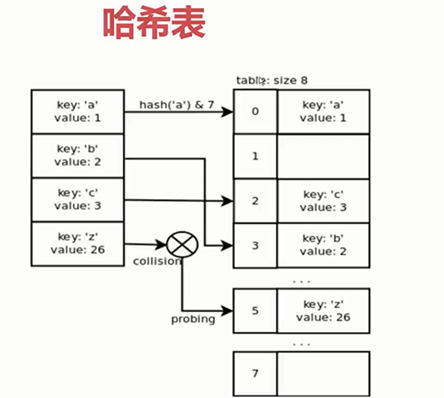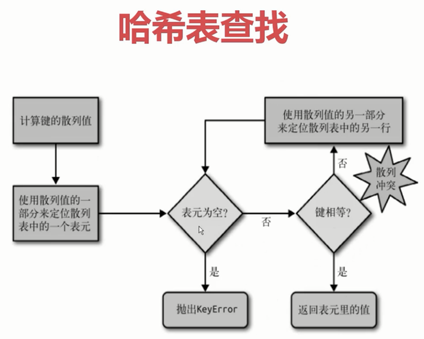6.1 collections中的abc
from collections.abc import Mapping, MutableMapping #dict属于mapping类型 a = {} print (isinstance(a, MutableMapping)) # True
6.2 dict的常见用法
a = {"lewen1": {"company": "imooc"},
"lewen2": {"company": "imooc2"}
}
# clear Remove all items from D.
# a.clear()
# pass
# copy, 返回浅拷贝
new_dict = a.copy()
new_dict["lewen1"]["company"] = "imooc3" # 浅拷贝,只是拷贝了指向。这里修改会修改了a 中原来的值
print(new_dict)
print(a)
---
{'lewen1': {'company': 'imooc3'}, 'lewen2': {'company': 'imooc2'}}
{'lewen1': {'company': 'imooc3'}, 'lewen2': {'company': 'imooc2'}}
---
import copy a = {"lewen1": {"company": "imooc"}, "lewen2": {"company": "imooc2"} } new_dict = copy.deepcopy(a) # 深拷贝,开辟独立的内存空间,并复制值 new_dict["lewen1"]["company"] = "imooc3" # 这里修改,并不会影响字典a的值 print(new_dict) print(a)
---
{'lewen1': {'company': 'imooc3'}, 'lewen2': {'company': 'imooc2'}}
{'lewen1': {'company': 'imooc'}, 'lewen2': {'company': 'imooc2'}}
---
# formkeys new_list = ["lewen1", "lewen2"] new_dict = dict.fromkeys(new_list, {"company": "imooc"}) print(new_dict) # new_dict["kevin"] # KeyError 不存在会抛异常 ret = new_dict.get("kevin","None") # print(ret) # items 方法 for key,value in new_dict.items(): print(key,value) ret_set = new_dict.setdefault("kevin","new mem") # 不存在key,就设置并返回值 print(ret_set) print(new_dict) new_dict.update( # update() 括号里面添加为可迭代对象 (("lewen", "imooc"),) ) --- {'lewen1': {'company': 'imooc'}, 'lewen2': {'company': 'imooc'}} None lewen1 {'company': 'imooc'} lewen2 {'company': 'imooc'} new mem {'lewen1': {'company': 'imooc'}, 'lewen2': {'company': 'imooc'}, 'kevin': 'new mem'}
6.3 dict的子类
#不建议继承list和dict class Mydict(dict): def __setitem__(self, key, value): super().__setitem__(key, value*2) my_dict = Mydict(one=1) # value*2 没有生效 # my_dict["one"] = 1 # 生效了 print (my_dict) {'one': 1}
---
from collections import UserDict class Mydict(UserDict): def __setitem__(self, key, value): super().__setitem__(key, value*2) my_dict = Mydict(one=1) # my_dict["one"] = 1 print (my_dict) {'one': 2}
---
# defaultdict from collections import defaultdict
my_dict = defaultdict(dict) my_value = my_dict["bobby"] # 没有则返回空字典 print(my_value) {}
6.4 set和frozenset
#set 集合 fronzenset (不可变集合) 无序, 不重复 s = set('abcdee') print(s) s2 = set(['a','b','c','d','e']) print(s2) s3 = {'a','b', 'c'} print(type(s3)) s = frozenset("abcde") #frozenset 不可变,以作为dict的key # 不能添加值 print(s) # --- {'a', 'e', 'c', 'd', 'b'} {'a', 'e', 'c', 'd', 'b'} <class 'set'> frozenset({'a', 'e', 'c', 'd', 'b'})
# ---
#向set添加数据 s = set('abcdee') another_set = set("cef") s.update(another_set) print(s) re_set = s.difference(another_set) # {'b', 'd', 'a'} re_set = s - another_set # {'b', 'd', 'a'} re_set = s & another_set # {'c', 'f', 'e'} re_set = s | another_set # {'a', 'f', 'c', 'e', 'd', 'b'} #set性能很高 # | & - #集合运算 print(re_set) print (s.issubset(re_set)) if "c" in re_set: print ("i am in set") # --- {'a', 'f', 'e', 'c', 'd', 'b'} {'a', 'f', 'c', 'e', 'd', 'b'} True i am in set
6.5 dict和set实现原理

from random import randint def load_list_data(total_nums, target_nums): """ 从文件中读取数据,以list的方式返回 :param total_nums: 读取的数量 :param target_nums: 需要查询的数据的数量 """ all_data = [] target_data = [] file_name = "D:电子书Python面试宝典Version8.1.pdf" with open(file_name, encoding="utf8", mode="r") as f_open: for count, line in enumerate(f_open): if count < total_nums: all_data.append(line) else: break for x in range(target_nums): random_index = randint(0, total_nums) if all_data[random_index] not in target_data: target_data.append(all_data[random_index]) if len(target_data) == target_nums: break return all_data, target_data def load_dict_data(total_nums, target_nums): """ 从文件中读取数据,以dict的方式返回 :param total_nums: 读取的数量 :param target_nums: 需要查询的数据的数量 """ all_data = {} target_data = [] file_name = "D:电子书Python面试宝典Version8.1.pdf" with open(file_name, encoding="utf8", mode="r") as f_open: for count, line in enumerate(f_open): if count < total_nums: all_data[line] = 0 else: break all_data_list = list(all_data) for x in range(target_nums): random_index = randint(0, total_nums-1) if all_data_list[random_index] not in target_data: target_data.append(all_data_list[random_index]) if len(target_data) == target_nums: break return all_data, target_data def find_test(all_data, target_data): #测试运行时间 test_times = 100 total_times = 0 import time for i in range(test_times): find = 0 start_time = time.time() for data in target_data: if data in all_data: find += 1 last_time = time.time() - start_time total_times += last_time return total_times/test_times if __name__ == "__main__": # all_data, target_data = load_list_data(10000, 1000) # all_data, target_data = load_list_data(100000, 1000) # all_data, target_data = load_list_data(1000000, 1000) # all_data, target_data = load_dict_data(10000, 1000) # all_data, target_data = load_dict_data(100000, 1000) # all_data, target_data = load_dict_data(1000000, 1000) all_data, target_data = load_dict_data(2000000, 1000) last_time = find_test(all_data, target_data)
#dict查找的性能远远大于list #在list中随着list数据的增大 查找时间会增大 #在dict中查找元素不会随着dict的增大而增大 print(last_time) #1.dict的key或者set的值 都必须是可以hash的 #不可变对象 都是可hash的, str, fronzenset, tuple,自己实现的类 __hash__ #2. dict的内存花销大(有大量空余的表元),但是查询速度快, 自定义的对象 或者python内部的对象都是用dict包装的 # 3. dict的存储顺序和元素添加顺序有关 # 4. 添加数据有可能改变已有数据的顺序
哈希冲突后重新计算位置
在剩余空间小于三分之一时,申请更大的空间,然后数据搬迁,有可能会改变顺序


